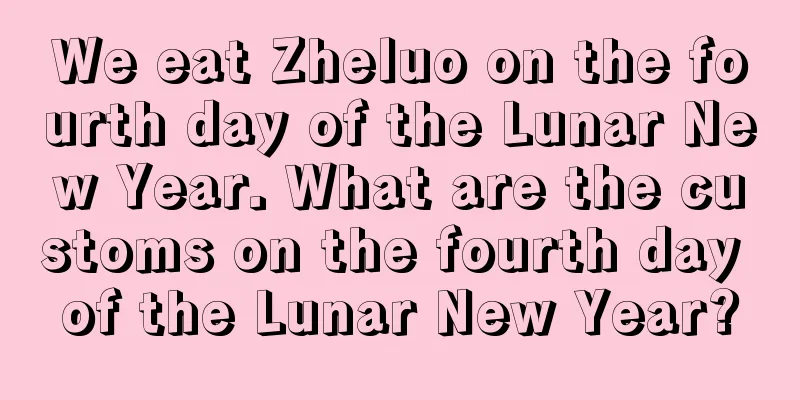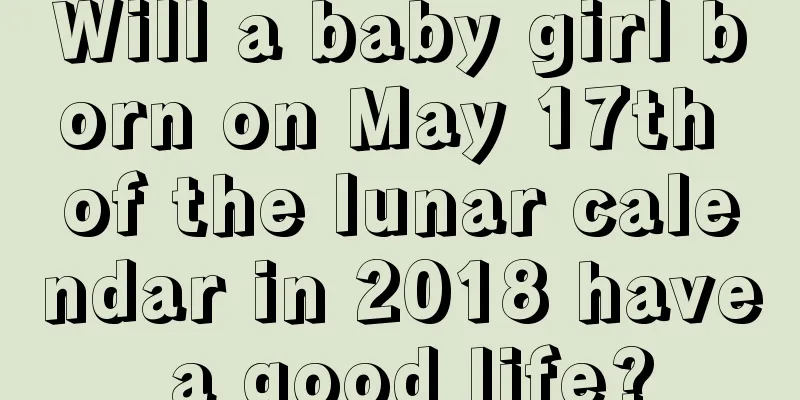We eat Zheluo on the fourth day of the Lunar New Year. What are the customs on the fourth day of the Lunar New Year?

Introduction: Why do we eat Zheluo on the fourth day of the Lunar New Year? It is said that on the fourth night of the Lunar New Year, the whole family will eat Zheluo together. The so-called "zheluo" is a hodgepodge of leftover food from the past few days, used to prepare for the New Year. So, what are the customs and taboos on the fourth day of the Lunar New Year? Please follow the editor to learn more about it below! New year, new atmosphere, there are countless topics about the Spring Festival. If you want to know more about the Lunar New Year, please continue to pay attention to Mr. Shui Mo’s exclusive Spring Festival special articles for you!Customs on the fourth day of the Lunar New Year: Eating "Zheluo"According to Chinese traditional customs, on the fourth day of the Lunar New Year, the whole family will gather together to eat "Zhe Luo". (Zhang Shoushen's "Hua La Qian'er": "The old lady had Sanhuo noodles for lunch and Zheluo for dinner." It can be seen that Zheluo refers to the leftovers from a banquet. In ordinary people's homes, the leftovers from the first to the third day of the first lunar month are called "Zheluo." Eating "Zheluo" reflects the good habits of our people to work hard and be thrifty. "Looking back at the past sages' countries and families, success comes from diligence and thrift, and failure comes from extravagance." The good qualities of our country's diligence and thrift will also be passed down from generation to generation.Customs on the fourth day of the Lunar New Year: Welcoming and sending off the godsAccording to ancient Chinese mythology, the fourth day of the Lunar New Year is when the gods return to the earth from heaven. There is a saying since ancient times that "sending off the gods early and welcoming them late". The so-called sending off the gods should start early in the morning, and it is not too late to welcome them in the afternoon. As for offerings, three kinds of meat, fruits, wine and food must be complete, and incense, candles and gold clothes must be burned. If the boss wants to fire someone, he will not invite him to worship the gods on this day. (The Han people have a very long history of worshipping the Kitchen God. After the Wei and Jin Dynasties, the Kitchen God had a name. Du Taiqing of the Sui Dynasty quoted the "Kitchen Book" in "Yuzhu Baodian" as saying, "The Kitchen God's surname is Su, his name is Jili, and his wife's name is Bojia." Zhang Kui and Gao Lanying are worshipped in the central Hebei region.) Worshiping the Kitchen God embodies the Han working people's beautiful wishes to exorcise evil, avoid disasters and pray for blessings.Customs on the fourth day of the Lunar New Year: Welcoming the Five Gods of WealthOriginally it meant to welcome the five traveling gods, and later evolved into welcoming the five wealth gods. In the old days, after the Spring Festival holiday, businesses would usually invite the Five Gods of Wealth on the fourth night of the New Year and open for business on the fifth day for good luck. Prepare sacrificial animals, cakes, fruits, incense and candles, ring gongs and drums, burn incense and worship, and devoutly and respectfully welcome the five wealth gods of the east, west, south, north and center. (At present, there are seven main gods of wealth worshipped by the Chinese people, namely: Li Guizu, the magistrate of Quzhou County, Hebei Province during the Northern Dynasties, Duanmu Ci (Zigong: the ancestor of Confucian merchants), Fan Li (Zhejiang merchants), Guan Zhong (Huizhou merchants), Bai Gui (Shanxi merchants), Guan Gong (Guan Di Pavilion), Bigan (the god of wealth and the ancestor of Hebei merchants), the God of Wealth, and Zhao Gongming.)The fourth day of the Lunar New Year: "Throwing away poverty"Clean the room and collect the garbage in one place, which is also called "throwing away poverty" in Han folk customs.Customs on the Fourth Day of the Lunar New Year: Binding the God of FireIn the north, on the fourth day of the Lunar New Year, every household in some rural areas will tie up the God of Fire. Tie corn stalks or wheat stalks to a stick, light it, and send it from your home to the river, which represents a year without fire in your home.Customs on the Fourth Day of the Lunar New Year: Taboos1. It is not advisable to travel far away. The Kitchen God will check the household registration, so every household must stay at home, prepare rich fruits, burn incense, light candles and set off firecrackers to welcome him, so it is not advisable to travel far away. 2. It is not advisable to use needles and thread. From the first to the fourth day of the New Year, shops are closed and women are not allowed to use needles and thread.Summary: The above article content is what the editor wants to introduce to readers about the analysis of the customs and taboos on the fourth day of the Lunar New Year. You can refer to it and feel the charm of our traditional culture! |
Recommend
What is the fate of a baby chicken born on October 27, 2017 in the lunar calendar?
Introduction: One of the factors that influence de...
Is the fifth day of the first lunar month the birthday of the God of Wealth? Is the fifth day of the first lunar month in 2020 an auspicious day?
Is the fifth day of the first lunar month the birt...
Is the Spring Equinox in 2019 an auspicious day for burying the deceased? What are the taboos on the Spring Equinox?
Introduction: Burial is also a very important matt...
Is it a good time to offer sacrifices on December 16 of the lunar calendar in 2019? What will the hexagram look like on January 10, 2020?
Introduction: Generally, an auspicious day should ...
Is it taboo to have sex during the summer solstice in 2019? Is it inappropriate to have sex before and after the summer solstice?
Introduction: The Summer Solstice is one of the 24...
A complete analysis of the fortune of the zodiac tiger during the National Day in 2020. Is the fortune good during the National Day?
The fortune of the zodiac tiger is also related to...
When is the Grain Rain solar term in 2019? What time is it on that day?
As the name suggests, the Grain Rain solar term is...
When is the Qingming Festival in 2021? Is the Qingming Festival in 2021 a good day? What are the prospects?
During the Qingming Festival, the sun is shining b...
What is the fate of a baby born in the Little Year of 2022? Is the child's fate good or bad?
The fortune of babies born at different times is d...
Why do we say "Ankang" during the Dragon Boat Festival? What is the meaning of wearing a sachet during the Dragon Boat Festival?
The Dragon Boat Festival is also known as the Duan...
Is it good to get a haircut on the first day of the dog days on July 16, 2020? What does the dog days mean?
Introduction: Haircuts also need to choose auspici...
Is July 16, the day after the Ghost Festival in 2019, a good day? Is today an auspicious day?
Introduction: Every day has its good and bad luck....
Is August 26th of the lunar calendar 2020 an auspicious day? What day is it in the new calendar?
The eighth month of the lunar calendar is also kn...
Is it auspicious to hold a funeral on May 28, 2020? Analysis of some terms in the lunar calendar
Introduction: Funeral is also one of the important...
Is the seventh day of the seventh lunar month in 2018 suitable for a haircut? Is it suitable for a haircut?
Introduction: According to Chinese tradition, hair...









